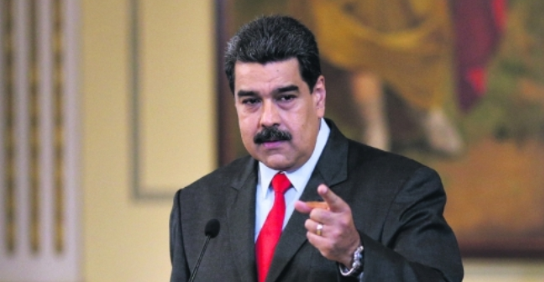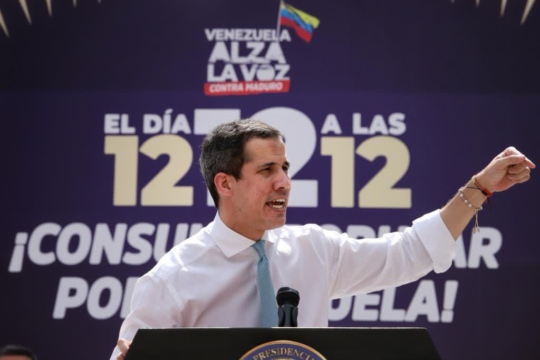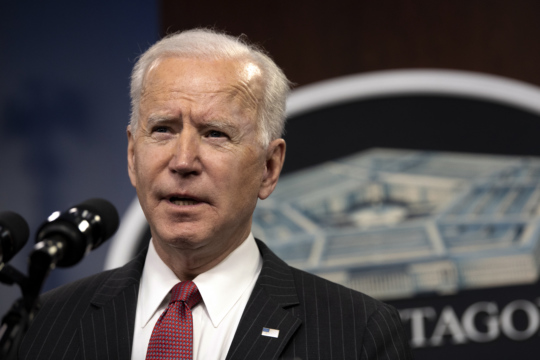
Why Is Venezuela’s Maduro Reshuffling His Cabinet?
Two months in, is military support for Maduro starting to waver, and is the opposition losing momentum?
Editor’s note: This post is written by Feliciano Reyna and Verónica Zubillaga, members of the Inter-American Dialogue´s Venezuela Working Group, together with Temir Porras. The Dialogue is publishing it as an important contribution to discussions regarding the response to Covid-19 in Venezuela.
In polarized Venezuela, it is rare these days to find a consensus about much of anything. The Department of Justice’s decision to indict Nicolás Maduro and several members of his inner circle was no different. Maduro responded by promising “Bolivarian fury” in response to any US aggression, while his political opposition lauded the indictments as vindication of their accusations against Maduro.
But Venezuelans of all political stripes agree on one thing: as the Covid-19 pandemic has overwhelmed even the most advanced public health systems in the world, our country’s collapsed health system is gravely exposed and cannot confront the threat alone. Whatever the current level of contagion, our country will be ill-equipped to respond as the disease expands. Like those in Italy, Spain, and New York, Venezuelan hospitals lack adequate testing kits, ventilators, and personal protective equipment for staff. Unlike those hospitals, they also frequently lack electricity, soap, and clean water. Thousands of doctors and nurses are among the millions who have fled the country in recent years, and many citizens who remain cannot afford to isolate at home.
Perhaps hundreds of thousands of lives—inside Venezuela and across its borders—now depend on whether our leaders can put aside their battle for control, engage politically in good faith, and momentarily put the wellbeing of citizens first by taking the urgent steps needed to combat the virus crisis and its consequences. For a nation suffering a pre-existing complex humanitarian emergency, the coronavirus is not only a public health threat but also a new reality that brutally exposes an already vulnerable majority affected by food insecurity and often unable to attend to its most basic needs.

While Venezuela’s political opposition led by Guaidó maintains that corruption and neglect of the public health system, as well as Maduro’s reluctance to accept some international aid, are largely responsible for the current “emergency within an emergency,” Maduro and his allies point out that US sanctions, including on oil, have denied the country much-needed revenue. This debate matters to the future of Venezuela, but it cannot be an obstacle to the immediate need for a political agreement to save lives amid the current pandemic.
Maduro may have pointed a way forward when he requested a $5 billion loan from the IMF for coronavirus response. As Maduro surely anticipated, the request was quickly rejected. Nonetheless, it was a remarkable admission of Venezuela’s desperate financial straits and need for international support to confront the virus. It also underscored that mobilizing such support will require at least a partial political truce between Guaidó and Maduro.
Is such an agreement possible? Past experience suggests tempering expectations; efforts to broker negotiations between Maduro and the opposition have broken down repeatedly, most recently in 2019. But the stakes have never been as urgent, and for many Venezuelans the fever of political combat is tempered by the existential urgency of the moment. Already, diverse sectors of civil society are raising their voices clamoring for a truce, a call that was echoed by the European Union.
And while Guaidó’s interim government did succeed in unfreezing $20 million in foreign-held state assets to support Covid-19 response in Venezuela, he must know there are limits to what can be done for Venezuelans without Maduro’s green light. Maduro, of course, is loath to do anything that empowers Guaidó, but he cannot tap international resources in a significant way without the approval of the Guaidó-led National Assembly. In other words, the two men need each other, and Venezuelans need them both.
Maduro has expressed openness to dialogue on Covid response and Guaidó has called for a government of national emergency. The urgency of the situation demands overcoming skepticism and exhausting all efforts to forge an agreement that could save countless lives. The coronavirus cooperation between Maduro and the government of Colombia, which does not recognize him, is perhaps a sign that political orthodoxies can be temporarily set aside in the face of the current pandemic, as is the recent coordination between the governor of Miranda state (a close Maduro ally) and three opposition mayors in that state.
The contours of a political agreement on Covid-19 response are not hard to envision. An urgent request for international assistance made jointly by Maduro and Guaidó would include a plan for Covid-19 response and the appointment of a locally-driven, specialized commission of health experts to coordinate it, as well as mechanisms to ensure aid is administered in a transparent, accountable, and apolitical manner with the support of multilateral agencies such as the United Nations that are considered legitimate by both parties. Maduro would recognize some key prerogatives of the Guaidó-led National Assembly, a tactical retreat from his efforts to undermine Guaidó’s legitimacy, but not one that requires resolution of Venezuela’s broader political impasse. Maduro would also facilitate full access for multilateral and humanitarian organizations across Venezuela’s territory. Under such an agreement, aid could be released in tranches subject to agreement by both parties, to ensure continued adherence to the deal. Most assistance would be delivered directly to implementing organizations, and none of it would be controlled exclusively by Maduro or Guaidó.
Were these conditions met, Guaidó would be justified in employing his one significant form of leverage —recognition by the United States and most Western donors— to unlock the international purse strings. Funding could come from multilateral donors such as the IMF, the Inter-American Development Bank, or the World Bank which recently created a $14 billion fast track facility to help countries respond to the coronavirus, or by tapping into potentially hundreds of millions of dollars of frozen funds of the Venezuelan state itself.
The complex mechanics of all these options, as well as the substantial political will needed to forge an agreement of any kind, are in stark contrast with the pivotal role the United States could play just by not standing in the way of a political agreement on Covid-19 response in Venezuela. The recent indictments against Maduro and his aides on “narco-terrorism” and other charges are a worrying sign that threatens to undermine any emerging momentum toward a humanitarian truce. The subsequent announcement of its “Framework for a Peaceful and Democratic Transition in Venezuela” in the midst of a pandemic outbreak was an awkward choice by Washington. A roadmap to entirely reset Venezuela’s political and institutional architecture is hardly an adequate tool to handle the looming public health emergency.
Amidst the current pandemic, both UN High Commissioner for Human Rights Michelle Bachelet and members of the US Senate have called for easing sectoral sanctions against Venezuela, a plea that would be far more consequential if Guaidó were to endorse it. Even Prime Minister Boris Johnson, a key ally of President Trump, has acknowledged the need to ease sanctions during the pandemic. Facilitating a swap of oil for humanitarian aid is one way to channel resources directly to the Venezuelan people.
At the very least, the US government should complement existing sanctions exemptions for medicines and medical equipment with a general license exempting specific medical goods in order to facilitate the donation or sale of testing kits, respiratory devices, and treatments. More broadly, it should use its domestic authorities and voting power in international organizations to back any agreement Guaidó can reach with Maduro that facilitates essential support for Venezuela’s Covid-19 response while ensuring funds are administered by vetted humanitarian organizations in a transparent and politically neutral manner.
The nature of this threat leaves us with no option but to stubbornly insist that Venezuela’s leaders forge a common front against Covid-19. The international community, including the United States, should join us.
Feliciano Reyna is founder and executive president of Acción Solidaria and founder of CIVILIS Human Rights in Venezuela. He is a member of the Dialogue´s Venezuela Working Group.
Temir Porras is visiting professor at Sciences Po Paris School of International Affairs. He served as Deputy Minister of Foreign Affairs of Venezuela and chief of staff to Nicolás Maduro.
Verónica Zubillaga, Dr. in Sociology (Catholic University of Louvain, Belgium), is an associate professor of sociology at the Universidad Simón Bolívar in Caracas and founder of Red de Activismo e Investigación por la Convivencia (REACIN). She is a member of the Dialogue´s Venezuela Working Group.
Covid-19 in the Americas: The Dialogue’s Coronavirus Updates
Two months in, is military support for Maduro starting to waver, and is the opposition losing momentum?
The Latin America Advisor interviewed Vanessa Neumann, former Juan Guaidó-appointed ambassador to the UK, on Venezuela’s political situation.
Given the huge demands on Washington – domestic and international – and today’s ravaged, fragmented, and leaderless region, this is probably not the right time for bold, ambitious initiatives. But the Biden administration should move quickly to renew partnerships with select countries, emphasizing recovery from Covid-19 and restoring economic and political stability.
 Video
Video
